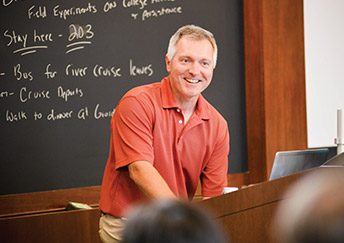
Contact Us
Institutional Communications
Bureau of Mines Building, Room 137
Laramie, WY 82071
Phone: (307) 766-2929
Email: cbaldwin@uwyo.edu
John List, Distinguished UW Alumnus
September 5, 2019

John List
“The world is my lab, and I use economics and field experiments to make the world a better place,” says Distinguished UW Alumnus John List, award-winning behavioral economist.
He has studied a wide range of problems and has developed scientific methods for testing economic theory directly in the marketplace—from the economics of selling baseball cards, to why people give to charitable causes, to the gender pay gap in the gig economy, to the most effective pre-K programs to help underprivileged kids succeed throughout their lives. He was also listed by Reuters as an odds-on favorite for a Nobel Prize in 2015.
He has helped governments throughout the world, including the Bush and Obama administrations and the United Kingdom, Australia and Bangladesh, among others. He’s helped companies such as Uber, Lyft and United Airlines. He’s helped universities and charitable organizations such as United Way, Sierra Club and Smile Train.
List grew up in Sun Prairie, Wis., and his dad was a truck driver and his mother a secretary. In middle and high school, this future economist would use the school library to chart stock prices and to try to develop models to forecast stock prices. He was also “a rabid baseball card collector” as a child, buying, selling and trading them well into adulthood.
List says that, as an undergrad at the University of Wisconsin-Stevens Point, “I would think about whether the economic learnings from the classroom could help to describe what was happening in the baseball card show.” In fact, some of his first field experiments as an economics Ph.D. student (’96) at the University of Wyoming with Nobel Prize winner Jason Shogren explored theoretical models of bargaining, best types of auctions and tendencies for discrimination in selling at baseball card shows.
At the University of Central Florida, he studied charitable giving. He found that people give to organizations “to feel a warm glow”—in other words, for selfish reasons, rather than for altruistic reasons such as the gift’s impact on other people. He also found that matching funds prompted people to give, but the size of the match had little effect. This work was the subject of a widely cited article by David Leonhardt in New York Times Magazine titled “What Makes People Give?”
At the University of Arizona, he worked with Nobel Prize winner Vernon Smith on the gender pay gap, and at the University of Maryland he looked at how to incentivize households to use technologies that help prevent climate change. This led to a year at the White House as senior economist on the President’s Council of Economic Advisers studying environmental and resource economics. While there, he worked on the Kyoto Protocol to curb emissions, the Clear Skies Act, free trade between the U.S. and Canada, and water legislation.
At the University of Chicago in his current position as department chair and the Kenneth C. Griffin Distinguished Service Professor in Economics, he’s been working with underprivileged children on a $20 million grant to increase the children’s odds of educational and future career success. To conduct this field research, he started his own preschools and then teamed up with his wife, Dana Suskind, professor of surgery and pediatrics and director of the pediatric cochlear implantation program at the University of Chicago Medicine, to assist kids from birth to 5 years old in the Thirty Million Word Center, which develops and tests evidence-based interventions and tools and partners with communities, using science as the cornerstone of their work. He will be tracking these kids throughout their school years and on into their adult working lives.
He credits the support and education he received at UW for success in graduate school and beyond. “The department was a family,” he says. “Graduate school is a lonely place, especially for a 22-year-old who just moved across the country. The family nature of both the other grad students and the faculty was the only reason why I made it through. I never would have got my Ph.D. without the family environment that the University of Wyoming provided.”
He adds, “If there’s a heaven—and I hope there is—it’s Laramie in the summer.”
Contact Us
Institutional Communications
Bureau of Mines Building, Room 137
Laramie, WY 82071
Phone: (307) 766-2929
Email: cbaldwin@uwyo.edu


